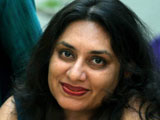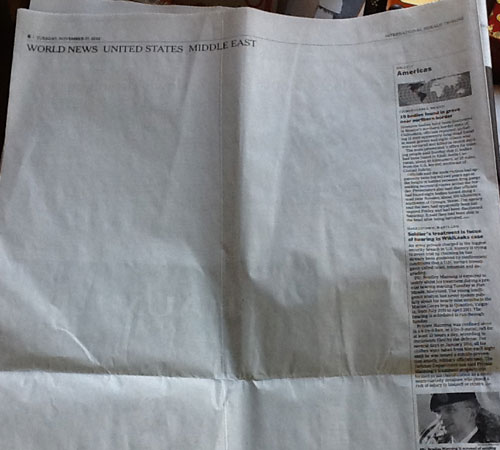On Self-Censorship
by Bina Shah / December 11, 2012 / No comments
Searching for clues to a mysterious blank page in the newspaper.
One morning, as I was reading the International Herald Tribune, I turned the page to the World News section (the Pakistani edition squeezes several sections together, so “America” and “Middle East” appear on the same page). Upon opening the section I was confronted with a huge white space that took up three-fourths of the page. This had to be a story that the editors deemed too offensive or controversial for Pakistani readership, but it was still astonishing to see such stark evidence of self-censorship in a time when Pakistan’s media is declared relatively free.

- Pakistan is a country of contradictions – full of promise for growth, modernity and progress, yet shrouded by political, social and cultural issues that undermine its quest for identity and integrity. My bi-monthly column “Pakistan Unveiled” presents stories that showcase the Pakistani struggle for freedom of expression, an end to censorship, and a more open and balanced society.

- Bina Shah is a Karachi-based journalist and fiction writer and has taught writing at the university level. She is the author of four novels and two collections of short stories. She is a columnist for two major English-language newspapers in Pakistan, The Dawn and The Express Tribune, and she has contributed to international newspapers including The Independent, The Guardian, and The International Herald Tribune. She is an alumnus of the International Writers Workshop (IWP 2011).
So I went online, to the New York Times‘ Global Voices page (the International Herald Tribune is “The Global Edition of The New York Times”), to see if I could identify the offending story. The Middle East page offered no clues. Was it the story on protests in Saudi Arabia, one of Pakistan’s long-time allies? People in Pakistan are very religious, and the political arm of Saudi Arabia, Wahabiism, has staunch supporters in the country. Publishing a story about unrest in Saudi Arabia could have repercussions amongst Wahabis here. No other story looked like a possibility. Of course, sometimes the editors don’t publish stories that are heavily pro-Israel, but typically they just leave those out. I moved elsewhere to find the answer to the puzzle.
Clicking on the “America” section revealed more stories that might have been the reason for that ghostly blankness in the newspaper. On that page a story on gay conversion therapy and related lawsuits was the most likely culprit. The discussion on gay rights simply doesn’t exist in Pakistan: Homosexuals are expected to live in utter secrecy in a Pakistani version of “don’t ask, don’t tell.” Any attempt to bring the issue out into the open is met with furious protest, as the American Embassy learned, to their chagrin, when they held an LGBT-themed event in Islamabad last year. They haven’t yet lived down the backlash from that wonderful idea (and I use the word “wonderful” with a heavy dose of irony; for a superpower conducting an illegal drone war in our territory to decide to host a gay pride event in the capital had to involve a massive failure to understand sentiments on the ground).
But let me be clear: Writers are always dealing with issues of censorship; no matter what country they live and work in. Certain topics are taboo in every culture, from Holocaust denial in Europe and 9/11 conspiracy theories in the United States, to gay rights in Pakistan and political issues in China. But while governments vary in their responses to these issues— in some places with sophistication (invoking technicalities which contravene freedom of speech rights) and in others with crudeness (taking a black pen to scantily-clad women in magazines)—society has instilled self-censorship in all its members. For example, Herta Muller recently said Mo Yan’s Nobel Prize was a “catastrophe” because he toes the Communist Party line; the implicit accusation being that Mo Yan censors himself in order to remain in the ruling party’s good books. But perhaps Mo Yan truly believes in what the Communist Party espouses, and in that case, it’s not self-censorship, but self-expression, just not the kind that Herta Muller wants to hear.
In the end, one of the International Herald Tribune‘s local editors told me the answer to the puzzle: The blank page had contained an interview with Nakoula Basseley, the man behind the film Innocence of Muslims. The headline? “From the Man Who Insulted Mohammed, No Regrets.” It immediately became clear why the editors had pulled the story: Scores of people died and millions of dollars worth of property was damaged in Pakistan during violent protests against the film. Even though the interview is not sympathetic to Nakoula at all, the editors determined that the story was too controversial to carry. When done in the name of public safety, self-censorship is the hardest pill to swallow, but sometimes the most necessary medicine tastes bitterest.





